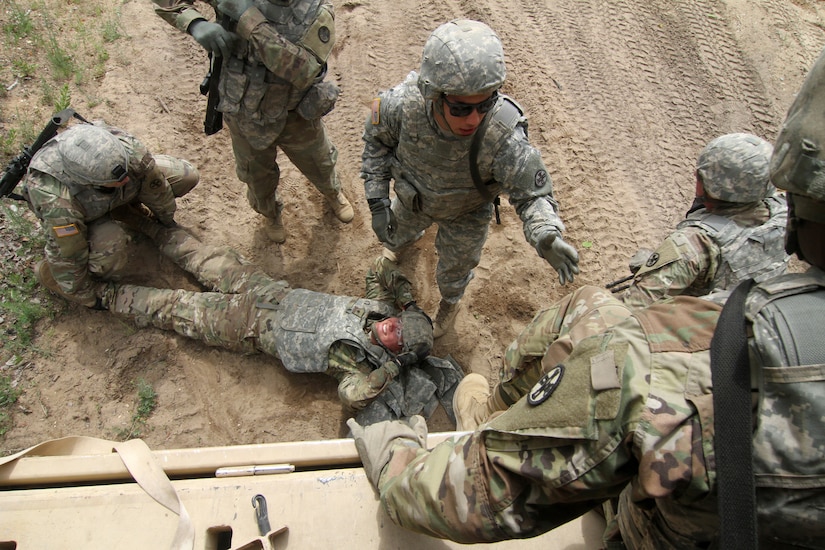By Army Sgt. Andrew Kuhn, 196th Mobile Public Affairs
Detachment
CAMP GRAYLING JOINT MANEUVER TRAINING CENTER, Mich. -- Members
of the Ohio Army National Guard practiced their ability to evacuate combat
casualties during an exercise here, June 19.
Army Spc. Matthew Sell, an interior electrician with the
1194th Engineer Company, role-played a casualty with a gunshot wound through the
chest and a dwindling pulse. Army Spc. Diantre Pressley, a plumber with the
1194th, provided first aid to Sell, while other soldiers provided security and
suppressive fire, and radioed a medical evacuation report.
"At first I was nervous," Pressley said.
"Then it just kicked in, and I started to go through the steps of what I
learned and what I needed to do."
With time working against them, Pressley and the team peeled
off Sell's vest to get a better look at the simulated wound. The team continued
to communicate their situation to Army Spc. Adam Reeder for the evacuation
report, while Pressley began to execute necessary lifesaving measures.
‘There was an Exit Wound’
"I slapped a chest seal on him, and there was an exit
wound. So, I put one on his back too," Pressley said. "It's my job to
make sure he's good until he gets [additional] medical care."
The soldiers then hoisted Sell above their shoulders into
the bed of their tactical vehicle.
"We just changed our technique," Pressley said.
"There are certain carries you can do without the vest, so we had to
switch to that to get there fast enough and efficiently."
As the truck tires stirred up dust down the rugged trail to
the landing zone, Pressley continued to reevaluate Sell's condition and
administer care.
As the truck halted, the tailgate dropped, and the team
poured out with Sell in tow to await the arrival of a CH-47 Chinook helicopter.
"I just made sure everybody was in the right places,"
Reeder said. "First establishing our security lines, and then there were
some situations where things had changed so we had to quickly reevaluate,
reassess and get everybody on the right page."
Casualty Evacuation
After several anxious minutes, the helicopter's beating
blades could be heard. Army Spc. Ryan Reneker painted the sky from the middle
of the field with his fluorescent yellow safety belt, hoping to be seen by the
helicopter’s pilots as they emerged over the tree line.
With a roaring pass, the helicopter looped around and began
its descent. The force of the rotor wash, like a tornado, blasted the air with
debris, and blowing sand stung exposed skin.
"I really wasn't sure what to expect," Reeder
said. "I think some of the new guys didn't expect the sand to come in as
quickly and as hard as it did."
Once the dust settled, Pressley and Army Spc. Anthony Romeo
collected Sell and rushed toward the waiting helicopter with support from the
rest of the team. The silhouette of the helicopter's crew chief greeted them as
they crossed the field with Sell to the waiting helicopter.
"My squad relies on me to take care of them if anything
would happen," Pressley said. "My training allowed me to properly
evaluate him, take care of him and take him to safety."
En Route to Field Hospital
For nearly 15 minutes they soared several hundred feet over
the training facilities here. As the Chinook landed, the adrenaline-fueled
soldiers flooded from the rear, and -- for one last time -- they held a secure
position until it departed.
"When I landed my blood was rushing," Pressley
said. "It was good to go fast and really apply our training to something
fast-paced like that."
Pleased with their run, the team eagerly mounted their
vehicle and returned to celebrate their success and share the news with the
other two teams back at the start of the training lane.
"After running through it, I was highly pleased,"
Reeder said. "The guys did an outstanding job, and I think everybody
really enjoyed the whole real-life scenario aspect of it."
"I really appreciated the willingness and motivation of
the younger soldiers," said Army Capt. Bryan Andrews, commander of the
1194th.









No comments:
Post a Comment